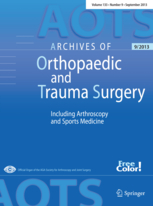 The Archives of Orthopaedic and Trauma Surgery has retracted a study about whether developing fistula puts hemodialysis patients at higher risk of carpal tunnel syndrome because it “duplicated substantial parts” and “manipulated some original data” from a study by other researchers.
The Archives of Orthopaedic and Trauma Surgery has retracted a study about whether developing fistula puts hemodialysis patients at higher risk of carpal tunnel syndrome because it “duplicated substantial parts” and “manipulated some original data” from a study by other researchers.
The retraction notice says it all:
The article has been retracted by the Co-Editor because it has been found that the authors have duplicated substantial parts and have manipulated some original data from the following article: Association between Carpel Tunnel Syndrome and Arteriovenous Fistula in Hemodialysis Patients, Jamal Gousheh, Afshin Iranpour, Plastic and Reconstructive Surgery, Vol. 116, No. 2, pages 508–513, DOI:10.1097/01.prs.0000172893.59458.8a, without acknowledging the source.
The study, “Carpal tunnel syndrome in patients who are receiving long-term renal hemodialysis,” was published in 2005 and has been cited 7 times, according to Thomson Scientific’s Web of Knowledge. The paper it seems to have borrowed from has been cited 27 times.
The paper’s corresponding author, Hamid Namazi, is an associate professor of orthopedic surgery at Shiraz University of Medical Sciences in Iran. Neither he nor the Marcus Krober, the journal’s editor in chief for orthopaedic surgery, has yet replied to our request for comment, but we’ll update if they do.
Hat tip: Rolf Degen
Like Retraction Watch? Consider supporting our growth. You can also follow us on Twitter, like us on Facebook, add us to your RSS reader, and sign up on our homepage for an email every time there’s a new post.
Retraction Watch is turning out to be my most entertaining email read. But what is being done to counter this increase in deceptions? Is there some way a list of miscreants can be created, to scare others who are tempted? Other suggestions to counter this trend? Jeffrey
There are all sorts of problematic issues related to the blacklisting of authors who commit misconduct (e.g., who maintains the list? For how long is the individual kept on the list? What criteria should be used to list someone?). Assuming that an agreement can be reached over these types of questions, perhaps the time has come to give that idea some serious thought.
FWIW, IEEE has the following entry in its guidance on handling misconduct, which suggests that may keep a list of sorts: “Repeated offenses for improper credited verbatim use shall result in suspension of publication privileges in all IEEE Publications for one year and rejection and return of all articles by the author(s) that are currently in review or in any IEEE publication’s queue (articles may be resubmitted after prohibition term has expired). (See also IEEE Policies, Section 7.11 – Procedures for Member Conduct Complaints.)” http://www.ieee.org/publications_standards/publications/rights/Section_822.html
And IEEE oversees over 100 publications. So, I assume that some sort of list is kept by that organization. Of course, what’s needed, IMO, is for some type of large umbrella organization like WHO, CrossRef, to oversee this type of project.